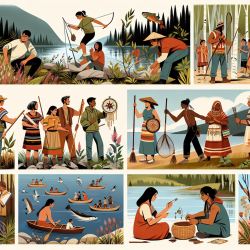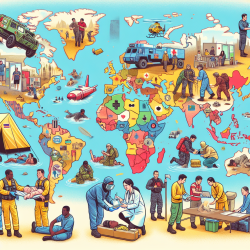The health and well-being of Indigenous Peoples are intricately linked to their connection with the land. This connection is not just a cultural or spiritual bond but a fundamental social determinant of health. The research article "Connection to the land as a youth-identified social determinant of Indigenous Peoples’ health" sheds light on how this relationship is perceived by Indigenous youth and its implications for health promotion. As practitioners, understanding and integrating these insights can significantly enhance our ability to support Indigenous communities effectively.
The Vital Role of Land in Health
The research conducted with the Yellowknives Dene First Nation (YKDFN) youth highlights that a deep connection to the land is a critical determinant of health. Through activities such as cultural camps and traditional knowledge transfer, youth identified their relationship with the land as essential for community well-being. This perspective offers practitioners a unique opportunity to incorporate land-based approaches into health interventions.
Implementing Land-Based Approaches
Practitioners can improve their skills by adopting strategies that emphasize the symbiotic relationship between people and the land. Here are some actionable steps:
- Cultural Skill Development: Facilitate workshops that teach traditional skills such as harvesting, fishing, and crafting. These activities not only preserve cultural heritage but also promote mental and physical health.
- On-the-Land Programs: Organize regular cultural camps that allow youth to engage with their environment. These programs should be designed in collaboration with community members to ensure they meet local needs and priorities.
- Elder Involvement: Encourage Elders to share their knowledge and stories with youth. This intergenerational exchange strengthens community bonds and reinforces cultural identity.
Encouraging Further Research
The findings from this study underscore the importance of involving Indigenous youth in health research. Practitioners should advocate for more participatory research that empowers youth to voice their perspectives on health issues. By doing so, we can develop more culturally relevant interventions that resonate with Indigenous communities.
Additionally, practitioners should consider conducting further research on how different Indigenous communities perceive their connection to the land and its impact on health. Such studies can provide valuable insights into tailoring health programs that respect and integrate traditional practices.
The Path Forward
As we move towards more inclusive and culturally sensitive health practices, it's crucial to recognize the role of land as a determinant of health for Indigenous Peoples. By embracing these insights, practitioners can contribute to building healthier communities through respect for cultural traditions and active engagement with the environment.
To read the original research paper, please follow this link: Connection to the land as a youth-identified social determinant of Indigenous Peoples’ health.










